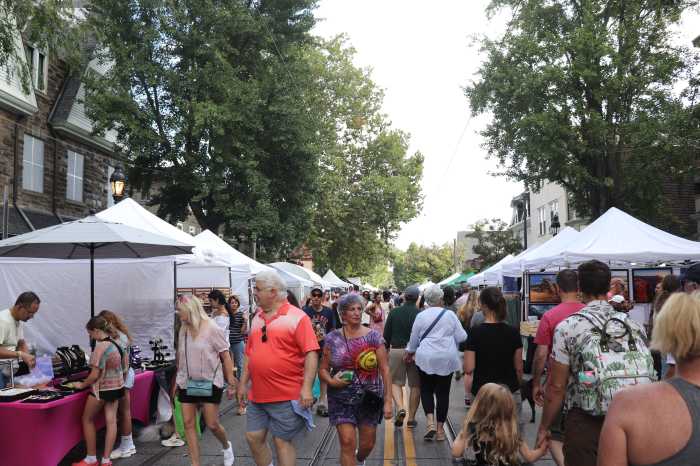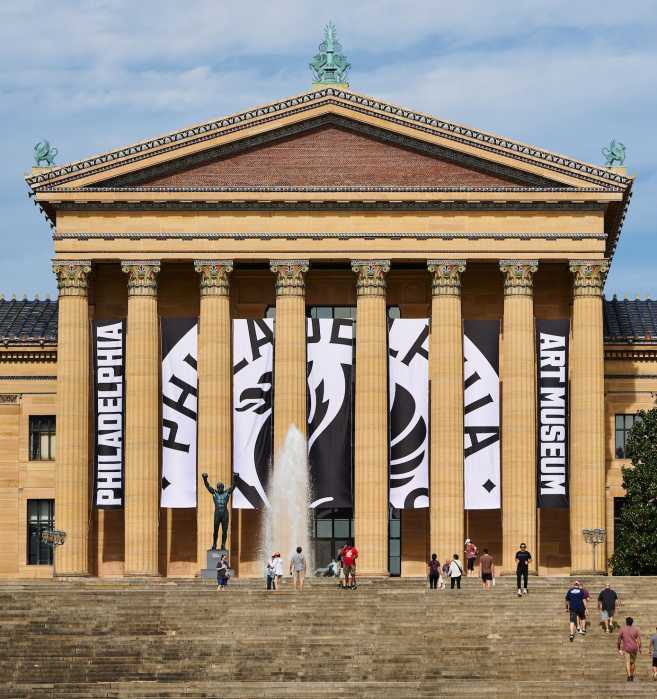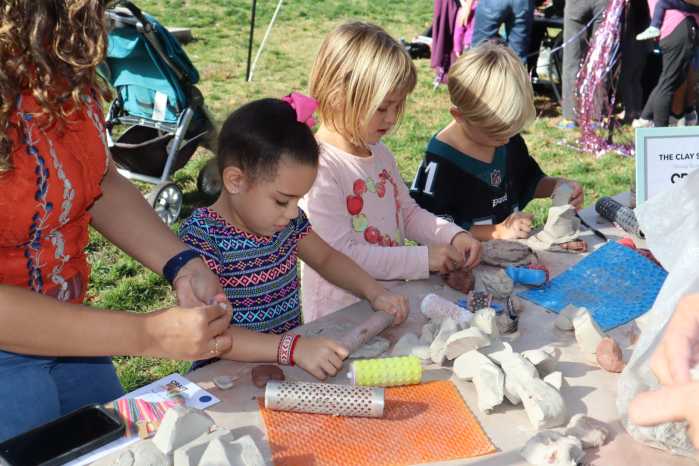Women’s History Month is a time to educate ourselves on important moments from our time here on Earth and to see how far we have come, and how far we still have to go.
One event at the Museum of the American Revolution is an exemplary showcase of just that.
On March 25, contemporary composer Dr. Melissa Dunphy will join the museum live for a virtual premiere of her original piece “Remember the Ladies,” which sets excerpts from a famous letter by Abigail Adams to acapella music performed by the 40-voice community choir Philharmonia. A virtual panel discussion about writing, composing, and performing will follow the performance.
Composing has always been in Dunphy’s blood as someone with a past in theater and music, but the history spin was sparked by some digging… literal digging in the dirt.
“Kind of overnight, we went from people who were interested in Philadelphia history a bit to total history and archeology fanatics,” says Dunphy.
The award-winning and acclaimed composer is talking about the moment she and her husband discovered a cheap property they bought in Old City in 2015 was sitting on two privies (a toilet located in a small shed outside a house or other building) that were filled with thousands of artifacts from the Revolutionary War and just before.
“If you look at all the properties in Philadelphia that go back that far, almost all of them would have had treasure troves of artifacts in a toilet pit in them as well. But because most of Philadelphia has been redeveloped and in the past, people didn’t care about this archeology, they would just throw it away. We’ve lost so much history in the city because we hadn’t valued that stuff,” explains Dunphy. The artist turned amateur archaeologist explained that the reason the artifacts on their own property were able to stay intact was because of its location right next to the highway. “Basically nobody had dropped this building down since it was built,” she adds.
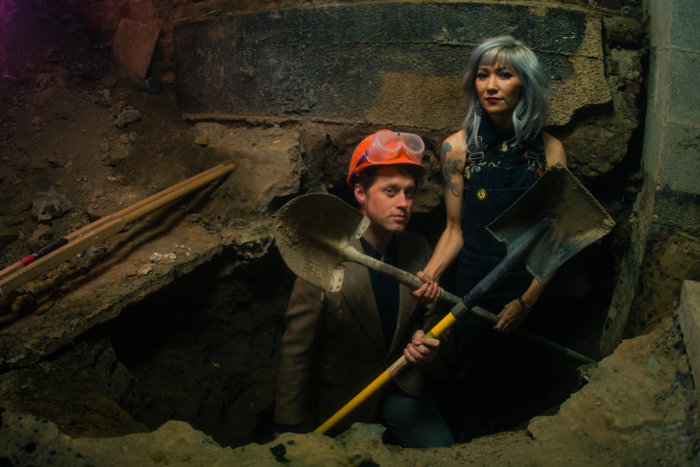
Dunphy and her husband dug up a literal treasure trove with items ranging from platters, to chamber pots, to a human tooth, to animal bones and even pieces of porcelain from one of the first porcelain factories in America, which was in operation in Philadelphia between 1770 and 1772. Other similar pieces from that Philly factory are on display in the Met Museum in New York City and the Philadelphia Museum of Art, and now, the Dunphy residence.
The treasure hunt in their own backyard also led the couple to start a podcast ‘The Boghouse,’ about their adventures in Philadelphia colonial archaeology. The content will keep coming as well, the home-grown archaeologists dug up their second privy a few months ago and still have thousands of artifacts to dig through. Dunphy herself took a crash course on the subject while simultaneously studying for her PHD at the University of Pennsylvania, but lately, the site and podcast has also gotten the attention of archaeologists from all over.
“The coolest thing about it is you just get to imagine that people were using this stuff here on this property 250 years ago, and you might never find out what their names were or know who they were as people, but it’s like this really visceral connection to the past,” says Dunphy.
Connecting to the past also fits into Dunphy’s composing career as well. As a composer, she already specialized in music that surrounded social or political topics. In fact, one of her successful pieces, ‘Gonzales Cantata,’ she wrote about former Attorney General Alberto Gonzales during the Bush Administration. That particular piece received recognition on the ‘Rachel Maddow Show’ and was featured in the Wall ‘Street Journal’.
“What I’ve really love doing in my work is writing pieces about political topics and using really unusual texts. That first work used actual transcripts from the Senate judiciary committee hearings, and I’ve also set political speeches, excerpts from essays [and even] testimony from Christine Blasey Ford and Anita Hill,” says Dunphy. “I kind of cooked up this idea, because I heard about Abigail Adams’ letter to her husband in 1776 in which she says while you’re creating these laws, I want to remind you to remember the ladies and treat them better. I love this. When we’re taught American history, we often don’t think about what the women at the time [thought] about the fact that there were all these men in the room making up the rules and they weren’t being given a voice. We don’t hear a lot of things in women’s voices, but this letter makes it clear that at least one woman was making her voice [known] to her husband and was asking questions. She’s demanding things that we would recognize in the 21st century as equality among the genders as well. That was kind of really exciting to me.”
Dunphy approached the MOAR and Philharmonia, who has commissioned work from her before, and used the excerpt and a little piece from the letter to write the song. The “Remember the Ladies” letter, written on March 31, 1776 and marking its 245th anniversary this year, is on loan to the museum from the Massachusetts Historical Society. It is featured as part of the special exhibition, “When Women Lost the Vote: A Revolutionary Story 1776-1807”, now on view at the MOAR through late April.
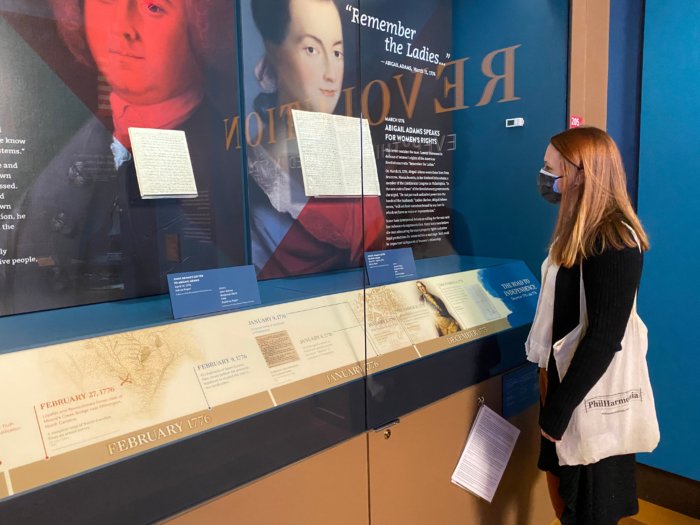
“It turned into almost like an anthem to women’s rights and love of America. My favorite part is putting a modern spin and an interpretation on words from the past and attitudes from the past. I feel like as a composer, setting texts to music feels a little bit like that process of acting… If I set words that seem kind of off the cuff in a really full way, it changes the meaning of them. I’m putting my own spin on the words without changing anything and putting a different interpretation on them, which I think can really speak to different audiences,” explains Dunphy. “There’s [also] a really meaningful resonance between Abigail writing this letter to her husband, who she is separated from physically in space. You can hear in her words, how much she misses being with her husband…We’re all in a pandemic right now, we’re all separated from loved ones, and now I’m reading it and I’m just like, oh, you know, there’s so many people I wish that I could be in the room with as well—And I think that comes across.”
The musical event from Dunphy will take place this Thursday, March 25, from 6:30 to 7:30 p.m. over Zoom.
Both Dunphy and her husband are also intending to use the space they bought, which was a magic theater in recent years, into a home for artists. Once it’s completed it will become the Hannah Callowhill Theater, which was actually the plan before they happened upon the two treasure troves in their own backyard. Hannah Callowhill was the second wife of William Penn, and she ran the colony of Pennsylvania for 14 years after Penn died. However, Penn’s sons from his first marriage took over after she died herself and erased her from the record, which ironically reignites the ideology that Abigail Adams wrote about when asking her own husband to remember the ladies.
Well, Dunphy remembers.
To learn more about Melissa Dunphy visit melissadunphy.com, and to learn more about the event on March 25, visit amrevmuseum.org.




